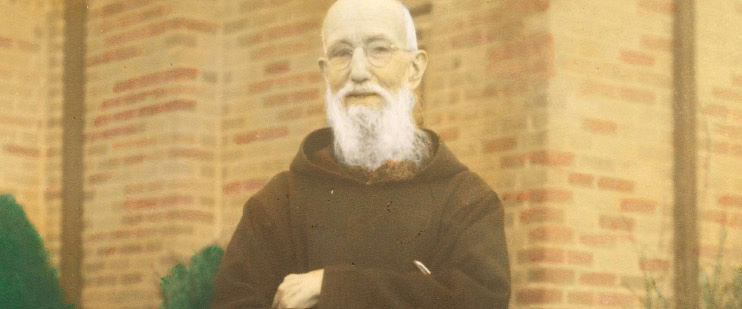Early in life, Blessed Solanus Casey was caught up in a clash of cultures, and it did not make life easy for him. But, in the end, God used those circumstances for his good and produced a saint.
Born Bernard Francis Casey to Irish immigrants in Wisconsin in 1870, Blessed Solanus first considered the priesthood after he witnessed a brutal murder while operating a street car as a young man. Wanting to make a difference in the world, he decided to try to do so through ordained ministry. Prior to entering the seminary, Blessed Solanus performed a variety of odd jobs and even came close to getting married. God, though, had other plans.
When Blessed Solanus entered the seminary in Milwaukee, his difficulty with studies in general was exacerbated by trouble mastering languages. Because of his poor grades in German, as well as other subjects, Blessed Solanus was dismissed from seminary.
Even though they had turned him away, those in charge of his seminary formation in Milwaukee believed that Blessed Solanus did indeed have a religious vocation. To fulfill this dream, they sent him to the Capuchin Franciscans, a community also very much conditioned by those of German heritage. Anxious about repeating history with the emphasis on German and, thanks to a dislike for their long beards, Blessed Solanus hesitated at first to give them serious consideration. Eventually, though, aft er receiving vocational counsel from a Capuchin friar, he decided to give entrance to the community a second thought. Turning over his heart’s anxiety to the Blessed Mother, he was divinely inspired. The Blessed Mother answered him when he heard “go to Detroit.” The Motor City was the home of that Capuchin province’s novitiate at the time, and a certain urgency compelled him to set out for the metropolis quickly.
Despite further doubts and fears, Blessed Solanus continued to turn to the Blessed Mother for assistance. As a result, he felt a sense of peace about his call. With the Franciscan habit, Blessed Solanus’ name officially changed from Bernard Francis to Solanus, after the 17th-century Franciscan missionary to South America, who, like Blessed Solanus, also loved to play the violin. Franciscan life fit like a glove for Blessed Solanus, but continued academic difficulties caused his superiors to decide he would remain a “simplex priest” after ordination, meaning he could hear no confessions nor preach a formal sermon.
Most of his priesthood, then, was spent as the monastery’s porter. Serving at monasteries in the greater New York City area as well as Detroit, this ministry put Blessed Solanus in touch with the real problems and situations of ordinary people. He easily forged relationships and was known for his wise counsel, humor and gentleness. Thus he was a most suitable counselor to the many who came seeking his guidance about their problems — availing himself to whomever needed him — in person, or by phone or letter. His reputation as a wonderworker grew thanks to his generous intercession and miraculous healings. When the Great Depression hit, Father Casey was instrumental in founding the Capuchin Soup Kitchen, which to this day tends to the needs of Detroit’s poor.
Because of his renown and reputation for the supernatural, Blessed Solanus’ Capuchin superiors attempted to distance the priest from the crowds and eventually assigned him to retirement at the remote Capuchin novitiate in Huntington, Indiana. But the correspondence continued — and so did the miraculous activities.
Blessed Solanus’ last years were spent suffering from arthritis and especially a skin disease that had plagued him for decades. His last days were spent hospitalized in severe pain. Those around him testified that he never complained or asked for anything to take away the pain. Blessed Solanus died in Detroit on July 31, 1957, and more than 20,000 people lined up to view his body before burial. Thousands more have sought his intercession ever since.
Beatified in 2017, Blessed Solanus’ liturgical memorial is July 30.
Michael R. Heinlein is editor of Simply Catholic.

